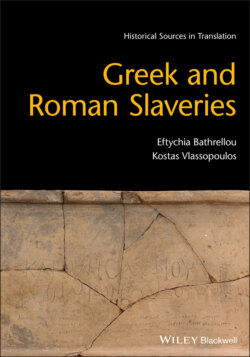Читать книгу Greek and Roman Slaveries - Eftychia Bathrellou - Страница 8
ОглавлениеNote to the Reader
Editions of Greek and Latin literary texts, inscriptions, and papyri
All translations are our own. Unless otherwise specified, we have translated what is considered the standard edition of the Greek and Latin literary texts. For papyri, we have translated the text appearing in papyri.info, while for inscriptions we have translated the text indicated in their reference number unless otherwise specified.
Signs used in the book
*** indicates that something of the original Greek or Latin text has been lost in transmission.
† indicates that the transmitted Greek or Latin text is problematic, and the exact wording of the original cannot be recovered.
[…] indicates that (i) text has been omitted by us or (ii) text has been lost through damage to the inscription or papyrus.
[aaa] lost text restored by the modern editor.
<aaa> text erroneously omitted in the transmitted Greek or Latin text but added by the modern editor.
(aaa) text added by us to facilitate understanding.
Names of persons, places, and peoples
We have used assimilated English forms of names of persons, places, and peoples whenever we judged them recognizable relatively widely (e.g. Attica, Rhodes, Lacedaemonians, the philosopher Socrates).
Names of ancient authors: We have followed the style of the Oxford Classical Dictionary both for the authors of the sources and for authors mentioned in them.
Other persons’ names: In translations of Latin sources, we have kept the Latin form of persons’ names, whatever the names’ origin. With one exception (source 12.2), in translations of Greek sources, we have transliterated people’s names of Greek origin but used the Latin form of Latin names.
Place names: We have used Greek transliterations of toponyms in the Eastern Mediterranean and Latin forms of toponyms in the Western Mediterranean, the northern Balkans, and northern Europe.
Names of peoples: For the names’ roots, we have followed the same policy as with place names, so that the people can be connected with the corresponding toponym relatively easily. But we have tended to use assimilated English endings throughout (e.g. Achaeans, Kilikians, Dacians).
